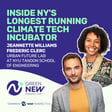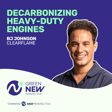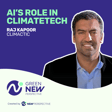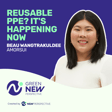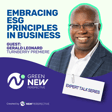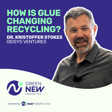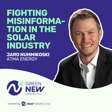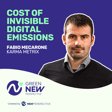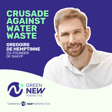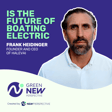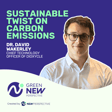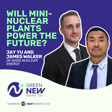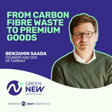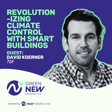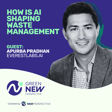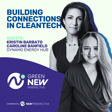Become a Creator today!Start creating today - Share your story with the world!
Start for free
00:00:00
00:00:01

Inside the World's Largest CleanTech Company: Podcast With Veolia North America
Join us as Patrick Schultz, President and CEO of Sustainable Industries and Buildings at Veolia North America, reveals how Veolia leads the way in clean technology. Discover their innovative solutions in Energy Management, Water Management, and Waste Management that help companies achieve Sustainable Solutions and the future of sustainable infrastructure. Don’t miss this deep dive into the powerhouse of Cleantech!
📚 Episode resources and links
- Website: https://www.veolianorthamerica.com/
- LinkedIn: https://www.linkedin.com/company/veolianorthamerica/
- YouTube: https://www.youtube.com/@VeoliaNorthAmerica
- X: https://x.com/Veolia_NA
🎧 Subscribe to our podcast
- Spotify: https://bit.ly/3PSWIyI
- Apple Podcasts: https://bit.ly/3RvlHte
- YouTube: https://bit.ly/3RDzkXg
- Deezer: https://bit.ly/3PvQaof
- Amazon Music: https://bit.ly/3PQlijS
💬 Follow GNP on Social
GNP Team:
- Host & Co-Producer: Dunja Jovanovic
- Executive Producer: Marko Bodiroza
- Creator: Nathan Harris
- Video & Content Editor: Marija Davidoski
Transcript
Introduction to Podcast and Guest
00:00:00
Speaker
Hello friends, you are watching Green New Perspective podcast, your go-to place when you want to learn about innovations happening within clean tech, nature tech, biotech, and agri tech space. Today I'm hosting Patrick Schultz from Veolia, one of the biggest and oldest clean tech companies out there. So we are going to explore the history of Veolia and how they're using their tech and experience to help other businesses and organizations to become more environmentally friendly. So stay tuned and enjoy the conversation. um
00:00:37
Speaker
Hi, Patrick, and welcome to the Green New Perspective podcast. Hi, Dunja. Can you, for starters, tell me and our audience a bit more about yourself and your role at Veolia North America? Of course. And first, thanks for um having me on your podcast. I'm really happy to have this conversation today. I'm Patrick Schulz. I'm the CEO of Veolia's Sustainable Industries and Buildings Business in the U.S. Maybe for my introduction, ill I'll start a little bit early on. um I actually grew up in a very small town in Germany um around a lot of nature. It was in the Black Forest in southwest Germany. And I think being around nature is a big part of why I'm quite passionate about sustainability and protecting the environment today and why I chose a career in the environmental field. And that that passion, I guess, continued into my time and in at university. I studied environmental engineering in Germany.
00:01:30
Speaker
And then over 20 years ago actually moved to the US for graduate school and now 20 years later I'm still here. I spent five years in academia um studying climate change, specifically the impact of climate change on ocean ecosystems, but then realized that maybe academia wasn't quite the right path for me.
Introduction to Veolia
00:01:48
Speaker
and so moved into consulting, the consulting for a few years and then 13 years ago I've joined Veolia in our municipal water business and had a number of different roles um throughout those 13 years and as I said at the beginning I now lead our industrial and commercial water and energy business in the US. To introduce Veolia, probably a good idea to talk a little bit about who we are because we're not as much of a household name in the US. We're certainly quite well known in Europe, we're a French company
00:02:16
Speaker
I've been around for many, many years. Veolia was actually founded 170 years ago. It's the first public-private partnership in the world to solve water and health crises and in French cities, and we're now the largest environmental company worldwide. and Just for scale, a few numbers. um We're a $48 billion dollars a year company with over 200,000 employees. another way to think about our scale we supply drinking water to over a hundred million people and we treat wastewater for almost a hundred million people around the world and what is the case for the only in america what challenges me or at least main challenges are you trying to solve
00:02:58
Speaker
Yes, in the US, um we're about a five and a half billion dollar business. We're the largest private municipal water company in the US. We're in the top three for hazardous waste management and then my business unit, sustainable industries and buildings. um We operate utilities and infrastructure at over 100 industrial sites and commercial buildings across the US and that's across a very wide range of ah markets, whether that's oil and gas, chemicals, food, and beverage processing, manufacturing, and we also work with state and local governments. and In terms of the the solutions that we provide or the problems that we we solve, um the way I think about it is that most companies ultimately want to produce goods, want to provide services, want to entertain us, whatever the case might be, and they need to do it in a way that's profitable, because otherwise they're not going to be around for a very long time.
00:03:49
Speaker
um But, and that's the good news, I think, for the world, but also for us as an environmental company, more and more companies want to do this by also reducing their impact on the environment. They want to produce their goods, they want to provide their services, but they also want to, let's say, reduce energy consumption, reduce their greenhouse gas emissions, reduce the waste that they produce, and or waste that goes to landfill, increase recycling rates. Or, again, relevant to our conversation, particularly today, reduce the pollution that goes into rivers and lakes or um reusing water more on site and really what we do as Veolia we enable those companies do both right we help them make the operations more profitable more reliable and at the same time help them reduce the impact they have on the environment.
Energy and Water Interconnectedness
00:04:32
Speaker
Can you tell me more about the trade-off relationship between wastewater and energy?
00:04:37
Speaker
Yeah, it's ah it's a topic I really like. and um it's ah When I think about it, in our industry, we often talk about the energy-water nexus. And in many ways, I actually feel that it's a pretty artificial concept, right? Because you're sort of talking about having two things, energy and water, come together. But the only reason you have to come up with this concept is because we artificially siloed those things to begin with, right? We kind of said, hey, there's a water business, there's an energy business, there's a waste business. um And even within Veolia for a long time, this is how we were organized. And what we realized is that in in many ways, these things are really, really interconnected. And really the one theme that kind of ties it all together, that this ultimately about creating economic value while preserving limited resources. And they can be materials, they can be water, they can be energy, right?
00:05:29
Speaker
And recognizing that these things really are closely connected the best solutions. um Look at all of them at the same time that's the reason we created the sustainable industries and buildings business unit rather than keeping a separate water and energy business actually say we can provide much more. um comprehensive solutions to our customers. And how do you help companies address the interconnectedness ah across facilities and communities as
Veolia's Resource Efficiency Solutions
00:05:53
Speaker
well? um ah Maybe i'll I'll give some more specific examples. I mean, generally when we look at these challenges, the solutions tend to fall into kind of two categories, right? It it can be around efficiency, so doing more with less.
00:06:07
Speaker
and it can be around circularity, meaning getting more value out of a resource by not having a linear model where you take a resource and then you waste it, but you actually recycle it, you return, and it can be a product, it can be water. and These topics are really relevant in some of the very fast-growing industries in the US today. If you think about AI, um the data center boom, right you have a lot of investment going into data center construction, A lot of those data center developers want to be green, so they're looking for renewable energy and solar in particular wind. And a lot of the places where there's a lot of solar power, renewable energy available tend to be states like Texas, you know, um that at the same time, while they have a lot of sunshine, also tend to be quite dry.
00:06:52
Speaker
And so this is where is one of these areas where water and energy start to connect because you need water for cooling of data centers and it becomes a challenge so you need to balance the access to renewable energy and the availability of water for cooling we see something very similar for green hydrogen developments big booming market as well as part of the energy transition is to build. these green hydrogen hubs and a lot of the developers of these hydrogen hubs come out of renewable energy space. They have they have wind power, they have solar power, but again and in order to produce hydrogen you actually need very large quantities of water that needs to be treated.
00:07:27
Speaker
So again, it's in order to produce that green fuel that hydrogen can be, you actually need to solve both the energy as well as the water problem. And where we get involved as Veoli is we work with hydrogen developers as an example to help them figure out where to source the water, how to treat it, and we're we're ultimately the company that can then operate the utilities and the water treatment. and Can we explain this a bit further by mentioning a specific client story where you helped clients achieve some of the energy goals or net zero goals? <unk> I'll pick an example that's maybe a bit unexpected. um I guess it's unexpected for two reasons. One, it's actually related to the oil and gas industry.
00:08:08
Speaker
So maybe not the first industry you would think of in a sustainability podcast. And then I'm also picking this example because it's not brand new. It's actually a project that goes back 15 years. And the reason I'm mentioning this one is because I want to make the point that a lot of the solutions and technologies we use have already been around for a long time. It's really more about deploying them rather than necessarily new technologies. And so the example I have is with an oil company, large oil and gas producer in central California. um It's a heavy oil field and the big challenge that they were facing was that for every barrel of oil they were producing at that site, they were also producing somewhere were around 15 to 20 barrels of water. In some way you could actually think about this being a water project where oil is decided is the byproduct of water production. The challenge of course is that that water that was coming up with the oil
00:09:00
Speaker
is highly contaminated and very has very high salinity, much more salty than than seawater. And so you can't just discharge it in an environment. And so what we as Veolia developed together with our technology sister company is a treatment process called OPUS, where we take this water that's produced alongside the oil and we can treat it to a point where some of the water can be used to make steam, which is used for the oil production process. But more than half of the water that comes up now is treated to a point where we can discharge it into the environment. And in this case, we actually discharge it into an artificial wetland, which has significant biodiversity benefits, right? It's good for migratory birds in that area and it's created a, it's really a boon for biodiversity in that area. But even more importantly, the water gets injected through that artificial wetland.
00:09:49
Speaker
and recharges the aquifer in Central California, an area that's experiencing a lot of drought. And so that water in the aquifer ultimately can be reused downstream, for example, for agricultural uses. And so it's really taking something that's been a highly contaminated source of water, putting in the treatment process. We operate it as Veolia and as a result, we can recharge an aquifer in a very drought-stricken area of the country. Yeah, you mentioned that the the technologies that you were using are not new. So can you talk about tech and which strategies were employed in this project? Yeah, so in in this case, it really was about finding clever ways of combining different treatment technologies to the point where we can take that water and treat it so that it can be discharged into and to into the environment. It's actually another really good example for that energy water nexus in some ways.
00:10:40
Speaker
Because in order to treat water to that point, you typically need membrane-based technology. So reverse osmosis is the last treatment step at that process in order to really get it to that to to the purity level that you need to discharge. And that's the case for a lot of advanced water treatment that we see today, for example, for water reuse or desalination and so forth. And the energy water nexus come into play here because these membrane based technologies solve the problem on the water side, but they're much more energy intensive. So you actually need a lot more energy to run membrane based treatment processes compared to more traditional water treatment. And this is something we're addressing, for example, in the Middle East.
00:11:21
Speaker
um where we're building some very large, we're involved in the construction of very large desalination projects, and we're now coupling desalination projects with very large solar installations in order to produce the energy that's needed to actually desalinate
Sustainable Infrastructure Leadership
00:11:35
Speaker
the water. And I see more and more of that happening in the US as well, is that we'll combine on-site water reuse with on-site solar, with on-site renewables in order to offset some of those energy needs. Yeah, that sounds exciting. While we're at at the exciting, what's the only big picture or big picture vision for sustainable infrastructure over the, let's say, in five to 10 years?
00:11:58
Speaker
I'm really happy to to be in the role that I am because it really feels like right now it's ah it's almost a golden age for for companies like Veolia. There's a couple of reasons for that if I kind of talk really about the bigger picture, and particularly in the US. A few big factors. yeah We have really a re-industrialization of the United States with through federal programs like the CHIPS Act. It's attracting semiconductor manufacturing back to the US, shortening supply chains also in pharmaceuticals. There's other industries a lot of investment going to industrial production obviously industrial production requires power programs water and and it needs to be done in a sustainable way and so that drives business at the same time there's funding sources available like the inflation reduction act.
00:12:44
Speaker
um that really make it more attractive to invest into renewable energy or sustainable infrastructure that drives a lot of it and then finally and i think that's probably the most important one more and more companies are starting to really think about. how can they run their operations with a reduced impact on the environment and that that's not only net zero carbon that's certainly at the top of the list for most companies but it's also landfill diversion so putting less waste into landfill increasing recycling rates making those commitments.
00:13:15
Speaker
And then also commitments to reducing the impact on on watersheds or water resources. The one thing i'll mention on in this case is that we actually did a survey um about a year ago where we interviewed about two hundred executives across nine industry sectors to understand how they think about their goals around carbon around waste around around water and. I think two really interesting insights that are relevant for how we think about um our opportunities to grow. One is on the water side. Water is only number three on the priority list at the moment. Carbon really is at the top of the list.
00:13:49
Speaker
but we expect it to catch up in the next few years. A lot of the respondents said, actually only only about 10% of the respondents said they currently have goals in place related to water reuse, but almost 50% said they're expecting to develop those kinds of goals in the next few years. So it's really going to catch up. um The other the really big opportunity for a company like Veoli that provides the solutions and that gets the work done is that a lot of companies have made commitments to reduce their impact on the environment, but don't necessarily have projects and actions in place to get there. And that's really where we come in. I mean, we're not a consulting firm, right? We're not an entity that talks about sustainability. We've been delivering sustainability for many, many years, I would say, even from before it was a buzzword.
00:14:35
Speaker
And that's really our business is to help companies achieve those goals by building infrastructure, upgrading infrastructure, and then operating infrastructure in a way that reduces carbon footprints, waste footprints, and water footprints. So we were talking about how you're helping other companies with their ESG goals, but what do you do inside within Veolia to help your own sustainability goals? A couple of things. Obviously, as Veolia, we have our own net zero commitment and um carbon reduction commitment. So we're not only looking at reducing the carbon footprint of our customers, but we're also making significant investments into our own carbon footprint to reduce it.
00:15:12
Speaker
Really good example actually from a few years ago is um part of my business unit we took over the utility island for a very large chemical manufacturing complex and in in virginia. And the main reason for us winning that contract was to improve the reliability of utility supply. As I said at the beginning, that's ultimately what customers are looking for. But one of the first things we did is we took a large co-generation plant that was producing steam and power for that site that was coal fired and we converted it from coal to gas. And so that allowed us to reduce the greenhouse gas emissions from that power plant that we now operate and will be operating for
00:15:52
Speaker
a couple more decades, it's a long-term contract, reduce that greenhouse gas footprint by about 60%. It's a really significant impact on that carbon footprint. and Since we are a marketing agency, I have to steer this conversation in a bit of a different direction and ask you a couple marketing or better set communication related questions here.
Challenges in Communication and Branding
00:16:11
Speaker
How do you explain what you're doing to the broader audience? How do you explain how do you communicate your complex technical solutions? And how did that change over time? Because you're one of the oldest sustainability companies out there. and that' it's it's a Those are good and in in some ways challenging questions, right? um
00:16:29
Speaker
While we are a very large company globally um and have a lot of history, I would say there's two main challenges that we're looking to address through our all communication and marketing strategy. The first one really is the the need to build more brand awareness in the US. You know, we're a household name in Europe, we're a household name even in the Middle East, we're not yet a household name in the US. How do we address that? I mean, a big part of that is just get the word out and talk a lot about the good things that we do, right? We're a very engineering-focused culture. It's not really in our nature to, you know, we do a lot of good work, but we don't necessarily talk about it. So we put a lot of effort into thought leadership. And there's a reason I'm on the podcast today, right? And it's one way of getting the word out.
00:17:12
Speaker
um You'll see probably more of us at at some of the big sustainability events like green and it's really about talking about the good things that we do and really building the kind of brand awareness even through um things like being the official sustainability partner. of the pickleball association and we we're sponsoring pickleball tournaments across the u.s. trying to make that which the fastest growing sport in the u.s. we're trying to make that a more ah greener sport right it's and it's a way to get the brand out the other piece and that's more really working internally with our sales teams and marketing.
00:17:46
Speaker
is ultimately and that's what we're trying to change is it's really about selling outcomes again we're a very engineering technically focused culture and i would say what comes natural to us and you may have noticed is when i gave the examples i like to go down into some of these technical details and talk about the cool things that we do but in the end most of our customers don't buy that what they really want to buy is an outcome they're looking for a solution to a problem that they have whether that's reducing their costs improving energy efficiency reducing operational risk improving safety in the case of our municipal business building stronger communities so
00:18:25
Speaker
we focused a lot on communicating more about what is it that our projects actually accomplish on behalf of our customers right it's not about hey we put a new boiler into a code generation facility but we reduced the greenhouse emissions by twenty percent forty percent sixty percent. or it's not about ah installing a solar project at a wastewater treatment plant, and we talk about the megawatts, it's really more about what does that do for the wastewater plant. It actually makes it more resilient because it's less dependent on the grid. In some cases, it can be fully independent from the grid. So in case there's brownouts, blackouts in the grid, the wastewater plant doesn't go offline because it may have its own microgrid that produces power, might have batteries for storage.
00:19:10
Speaker
and it actually increases the resiliency and it reduces greenhouse gas emissions. So really focus much more on what are these outcomes um that our that our solutions actually accomplish. And that's a andd say it's a bit of a change management approach with the sales team because it's not traditionally how we sold our solutions. It was much more of a technical, here's what we do, does this you know these are the technical solutions too, but this is what it means for you. Yeah, I guess it's more of a storytelling strategy than explain. But can we talk about challenges that you see in the future when we talk about marketing, especially now when, like you said, sustainability became a buzzword? Yeah, I mean, I think it's... um
00:19:52
Speaker
you know Even 10-15 years ago when I started with Veolia, being in an environmental company was maybe more of a unique position to be
Veolia's Market Position and Ambitions
00:20:01
Speaker
in. Nowadays, there's a lot of companies, a lot of startups, other established companies coming into the environmental space. And so having a voice that stands out from the crowd, I think is more of a challenge than maybe it was 15, 20 years ago and in the environment. um ah What I think a lot about is while there's a lot of entities, companies, startups that are interested in solving climate change, that are interested in solving environmental problems, what is truly unique about what we do as Veolia? And that's what I'm trying to emphasize to kind of overcome that challenge of being drowned out by the noise, right?
00:20:38
Speaker
and I would say there's two things that come to mind one is it's really not anything new to us right we've been doing this for a long time we actually have a decades long track record of solving these kinds of problems and delivering results where is a lot of ah new entrance in the market may not have that kind of track records really focusing on. you know we're a old company we've been around for a long time and sometimes that can be a challenge because maybe you're not quite as nimble and don't maybe move quite as fast but i really see this as a strength of ours because we have that reputation we have that we have that track record the other piece is really around emphasizing that what i like to say is you know sustainability we're the ones to do the work and get it done right this is not about reporting this is not about
00:21:23
Speaker
consulting this is about real investment and upgrades and construction of new infrastructure and then operating that infrastructure in a different way and i think that's important right because sustainability and reduction greenhouse gas emissions is not going to be achieved. through goal setting and reporting, it ultimately gets achieved through new infrastructure, upgrades of infrastructure, new technologies, and operating things differently in a more efficient way. And that's really the core of what we do. So really emphasizing this. We're the ones to do it. We're the ones who roll up our sleeves and get the work done. That's really the the emphasis for us.
00:22:00
Speaker
changing the infrastructure is the answer I usually get here in the podcast from the clean tech companies, clean tech leaders. My next question for you is how do you commit to long-term partnerships and collaborations, especially on the new market? is actually interesting. We recently released our global strategy for Veolia for the next four years, call it our green up strategy. And um aside from obviously setting our growth objectives and priorities for the various markets and geographies that we want to be in, we've also spent quite a lot of time as a company thinking about what enables the growth that we want to accomplish. And for the US, that growth actually, by the way, is where our goal is to double our business in the US by 2030. So very ambitious growth goals.
00:22:41
Speaker
One big enable that we've identified in our strategy is what we call alliances and partnerships because it's very clear that the challenges we're all trying to address here climate change other environmental challenges. I really don't think there's any company in the world that can do it on their own and despite being the largest environmental company it's very clear to us that we need to work with others to accomplish those goals and for us partnerships can really take many different forms. It can be partnering with the local communities that we operate in, not-for-profit organizations, for example, to help ah attract new talent into the environmental industry. One thing that we've done recently is we've actually open sourced our water operator training so anybody in the world can have access to our Veolia Academy um and learn essentially online how to be and a water operator. And we make this available to anybody um for free. That's part of building that alliance and partnership with
00:23:35
Speaker
with communities and and and bringing people into our industry. um robll exciting yeah Another way, and this is maybe an example out of my business, I mentioned a lot infrastructure upgrades and then operating that infrastructure. Now, as Veolia, we're not a construction company, right? So in order to upgrade infrastructure, we always need to work with partners, um engineering and construction firms as an example. And um we recently really good example that illustrates this is we work with key which construction one of the largest construction firms in the US and we we have several projects are working on today but we recently jointly um submitted a bid for Henry Ford health systems in Michigan.
00:24:16
Speaker
There's a very large hospital that's being built and we were successful in winning basically the entire energy island. So Kiewit is going to design and build um that energy island. And then as Veolia, we were going to operate it um for 30 years and really provide, I would say, energy as a service to that to that hospital. And what that allows us to do is bring a very comprehensive offer to our customers that combines the engineering and construction capabilities that are brought by our partner and combine it with the operations and service capabilities that we have. And in the case of this hospital, what that will allow us to do is we're aiming to build the first net zero hospital system in the US.
00:24:56
Speaker
A lot of focus on waste heat recycling, digital energy management, really focusing on electrification, and bringing a lot of innovations to this. And we wouldn't be able to do this on our own. does This is really only a possible through these committed long-term strategic partnerships. And why do you think that makes these partnerships, collaborations, successful? I think it's about finding um partners that have complementary skill sets on the one hand, right? Where it's very clear that one plus one is more than two, right? Where it's the, where by combining, in this case, for example, engineering and construction capabilities and a very long track record in the US for building infrastructure with our ability to operate this kind of infrastructure in the long term. So the complementarity is really important. I think what's even more important is an alignment in culture.
00:25:45
Speaker
It's really important for us to find companies that have an aligned purpose and an aligned culture. And if I take the example of Kiewit, it's a really good one. They're a very engineering focused culture. it's a When we talk to them, it just feels like I'm talking to colleagues, right? It feels very natural to work with ah with them. And that's something that's important for us. We always look for partners with a strong alignment on the purpose, strong alignment in the culture. And my last question for you is not related to Veolia, but to you personally.
Advice for Aspiring Environmentalists
00:26:16
Speaker
You said that you knew from the beginning what you're going to do, that you're going to work something related to environmental science, environmental protection. What advice would you give to someone who's new to the field and maybe not schooled in this field, but i want to join the community? I mean, the first thing I'll say is follow your passion, right? I mean, if this is something you feel strongly about,
00:26:36
Speaker
I would say anybody who goes to work in the morning and feels that their work has an impact on the world, that's meaningful, right? And that's one of the things that gets me out of bed in the morning is that when I go to work, I feel like I'm i'm doing something positive. It's not just a job. Following that passion is important. I think another way of if particularly if you're maybe not in the field today but you're interested there's a lot of conferences around sustainability there's a lot of industry organizations i think there's good ways of just kind of you know sticking your foot in the water a little bit and testing out and building a network and.
00:27:10
Speaker
and talking to people who already are working in the field and seeing what ah what an area could be. I mean, I talk a lot about how our um industry is very engineering and, you know, science-heavy, but some of our most successful employees in Veolia came from different careers and are not necessarily engineers. You don't have to be an engineer to work and in an environmental space. It's really more about bringing the passion to work, right, on the one hand and thinking about what are the skills that you have and how did they translate into this industry. Thank you, Patrick. I hope this is going to inspire more people to join the community because it is great to work in in the climate space. Absolutely. Well, thank you.
00:27:55
Speaker
Hey, well, you've come to the end of the conversation with Patrick Schulz from Meolia and to the end of yet another episode of the Green New Perspective podcast. And now is the perfect time for me to tell you a little bit about our sponsor. They are New Perspective, a Boston-based marketing agency working with clean tech clients only so if you're curious to see how a marketing agency can help your clean tech business to grow please check out the info in the description of this episode and if you like what we do here with Green New Perspective podcast hosting people from clean tech companies giving them a place where they can
00:28:31
Speaker
talk about their technologies. Consider subscribing to our channel on your favorite streaming platform. We are everywhere so it will be easy for you to subscribe. Hopefully you like this conversation and I'll catch you in the next one. Bye!

